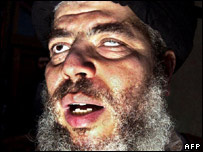U.S. argues for extradition of radical Islamic cleric
The United States argued Thursday for the extradition of a radical Islamic cleric imprisoned in Britain, accusing him of involvement in a global conspiracy to wage terrorist attacks on the U.S. and other Western countries.
Abu Hamza al-Masri has been charged in the United States with trying to establish a terrorist training camp in Oregon, conspiring to take hostages in Yemen and facilitating terrorist training in Afghanistan.
He is serving a seven-year sentence in Britain for fomenting racial hatred and urging his followers to kill non-Muslims. "He advocated the defense of Islam through unlawful, violent and armed aggression," Hugo Keith, a lawyer representing the U.S. government, said during a hearing in a London court.
The hearing started a day later than scheduled because al-Masri was recovering from an operation to remove a bone from the stump of one of his arms.
He lost both arms below the elbows and an eye fighting the Soviet occupation of Afghanistan in the 1980s. He now has hooks for hands, and a glass eye.
Al-Masri was arrested on an U.S. extradition warrant in May 2004, but the process was put on hold while he stood trial in Britain and then appealed his convictions. In January, the House of Lords denied al-Masri permission to make further appeals, and his extradition proceedings went back on the agenda.
Al-Masri's lawyer, Alun Jones, said the extradition application should be rejected because he believed some of the evidence against the cleric was extracted by torturing a defense witness. Jones did not say where the alleged torture may have occurred but the witness, Feroz Abbasi, was a former British Guantanamo Bay detainee.
He was initially arrested by Afghan forces and handed over to U.S. authorities. The court heard that Hamza helped pay for Abbasi to travel to Afghanistan. "The court ought to conduct here an inquiry," he said. "There is reasonable cause to suspect this extradition request is founded in significant parts on evidence obtained by torture."
Outlining the U.S. case, Keith said Hamza provided a satellite phone and 500 hours of airtime to a group responsible for the 1998 kidnapping of 16 western tourists in Yemen. Four of the tourists died in a shootout between the abductors and Yemeni security officials.
Keith said the planned training camp in Oregon would have been used to prepare recruits to "kill enemies of Islam" in Afghanistan, training them in weapons use, hand-to-hand combat and martial arts.
"The general allegation is that Mr. Hamza is a member of a global conspiracy to wage jihad against the U.S. and other Western countries," Keith said. "Jihad carried out in numerous parts of the world — the U.K., Afghanistan, Yemen and U.S."
Keith also detailed another indictment that claimed al-Masri funded travel to Afghanistan for two men who pleaded guilty in April 2003 to plotting to set up the training camp in Bly, Ore.
If tried and convicted in the United States, Al-Masri, the former head preacher at London's Finsbury Park Mosque, would carry out the rest of his sentence in Britain before serving any prison term in the U.S.
